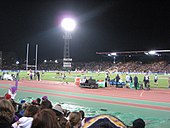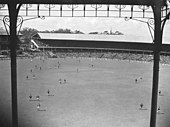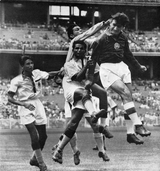Association football at the 1956 Summer Olympics
| Tournament details | |
|---|---|
| Host country | Australia |
| Dates | 24 November – 8 December 1956 |
| Teams | 11 |
| Venue(s) | 1960 → |
The association football tournament at the 1956 Summer Olympics was won by the Soviet Union.[2][3]
Background
Following five withdrawals, the tournament featured three
The tendency of Eastern bloc countries to provide state-funding for their athletes put Western amateurs at a significant disadvantage. As a result, all Olympic football tournaments 1952 onwards were dominated by the Soviet Union and its satellites.[4]
Venues
| Melbourne | ||||
|---|---|---|---|---|
| Olympic Park Stadium | Melbourne Cricket Ground | |||
| Capacity: 40,000 | Capacity: 104,000 | |||

|

| |||
Final tournament
First round

Five of the sixteen qualified teams withdrew before the final draw: ![]() China (who boycotted the Games to protest the reception of Taiwan),
China (who boycotted the Games to protest the reception of Taiwan), ![]() Egypt (who boycotted the Games to protest the Israeli, British and French invasion),
Egypt (who boycotted the Games to protest the Israeli, British and French invasion), ![]() Turkey,
Turkey, ![]() South Vietnam, and the recent World Cup runners-up
South Vietnam, and the recent World Cup runners-up ![]() Hungary, a nation that was cheered in other Olympic contests due to their ongoing suppression by Soviet troops.
Hungary, a nation that was cheered in other Olympic contests due to their ongoing suppression by Soviet troops.
Therefore, only three games were played in the first round: as China and Turkey had been drawn against each other, their match was scratched.
The Soviet Union defeated the United Team of Germany 2–1, Great Britain defeated Thailand 9–0, and Australia defeated Japan 2–0.
| Soviet Union | 2–1 | |
|---|---|---|
| Isayev Streltsov |
Report | Habig |
Byes: Bulgaria ![]() (drawn against Egypt, who withdrew), India
(drawn against Egypt, who withdrew), India ![]() (drawn against Hungary, who withdrew), Indonesia
(drawn against Hungary, who withdrew), Indonesia ![]() (drawn against South Vietnam, who withdrew), United States
(drawn against South Vietnam, who withdrew), United States ![]() and
and ![]() Yugoslavia (drawn against each other: match was postponed to the quarter-finals).
Yugoslavia (drawn against each other: match was postponed to the quarter-finals).
Quarter-finals
Yugoslavia defeated the United States 9–1.
Great Britain lost 6–1 to Bulgaria, and at half-time, ratings from HMS Newcastle vaulted the fence and exhorted the team to show more grit, after which they were peacefully escorted off the field.[5]
The Soviets drew their game against Indonesia 0–0 and won 4–0 in the replay.
The Indians defeated Australia 4–2 with a hat trick by centre forward
| Yugoslavia | 9–1 | |
|---|---|---|
| Veselinović Antić Mujić Papec |
Report | Zerhusen |
| Soviet Union | 0–0 (a.e.t.) | |
|---|---|---|
| Report |
| Australia | 2–4 | |
|---|---|---|
Morrow |
Report | D'Souza Krishnaswamy |
Semi-finals
Yugoslavia defeated India 4–1. It would be their third consecutive Olympic final, after losing both in 1948 and 1952.
The Soviets defeated Bulgaria 2–1. Bulgaria scored first and conceded two goals in the last six minutes of the game.
| Yugoslavia | 4–1 | |
|---|---|---|
Salam ) |
Report | D'Souza |
Finals
Bulgaria took Bronze defeating India 3–0.
Bronze Medal match
Gold Medal match
| Soviet Union | 1–0 | |
|---|---|---|
| Ilyin |
Report |
| Team details | ||||||||||||||||||||||||||||||||||||||||||||||||||||||||||||||||||||||||||||||||||||||||
|---|---|---|---|---|---|---|---|---|---|---|---|---|---|---|---|---|---|---|---|---|---|---|---|---|---|---|---|---|---|---|---|---|---|---|---|---|---|---|---|---|---|---|---|---|---|---|---|---|---|---|---|---|---|---|---|---|---|---|---|---|---|---|---|---|---|---|---|---|---|---|---|---|---|---|---|---|---|---|---|---|---|---|---|---|---|---|---|---|
| ||||||||||||||||||||||||||||||||||||||||||||||||||||||||||||||||||||||||||||||||||||||||
Bracket

| First round | Quarter-finals | Semi-finals | Final | |||||||||||
| |
||||||||||||||
| November – Olympic Park | ||||||||||||||
| bye | ||||||||||||||
| |
9 | |||||||||||||
| |
1 | |||||||||||||
| |
||||||||||||||
| December – MCG | ||||||||||||||
| bye | ||||||||||||||
| |
4 | |||||||||||||
| November | ||||||||||||||
| |
1 | |||||||||||||
| |
2 | |||||||||||||
| December – MCG | ||||||||||||||
| |
0 | |||||||||||||
| |
2 | |||||||||||||
| |
4 | |||||||||||||
| |
||||||||||||||
| December – MCG | ||||||||||||||
| bye | ||||||||||||||
| |
0 | |||||||||||||
| |
1 | |||||||||||||
| |
||||||||||||||
| December – Olympic Park | ||||||||||||||
| bye | ||||||||||||||
| |
0 | |||||||||||||
| November | ||||||||||||||
| |
4 | |||||||||||||
| |
2 | |||||||||||||
| December – Olympic Park | ||||||||||||||
| |
1 | |||||||||||||
| |
2 ( a.e.t. )
| |||||||||||||
| |
1 | |||||||||||||
| |
||||||||||||||
| December – MCG | ||||||||||||||
| bye | ||||||||||||||
| |
6 | |||||||||||||
| November | December – MCG | |||||||||||||
| Great Britain
|
1 | |||||||||||||
| Great Britain
|
9 | |
0 | |||||||||||
| |
0 | |
3 | |||||||||||
Goalscorers
There were 53 goals scored in 12 matches, for an average of 4.42 goals per match.
4 goals
3 goals
- Ivan Petkov Kolev
 Jack Laybourne
Jack Laybourne Muhamed Mujić
Muhamed Mujić Zlatko Papec
Zlatko Papec
2 goals
1 goal
1 own goal
- Muhamed Abdus Salam
Medalists
| Gold | Silver | Bronze |
|---|---|---|
Blagoja Vidinić
|
See also
- Association football at the 1956 Summer Olympics – Men's team squads
- Association football at the 1956 Summer Olympics – Men's qualification
References
- ^ Olympic Football Tournament Melbourne 1956 – Top goalscoring players. FIFA.com
- ^ "Football at the 1956 Melbourne Summer Games". Sports Reference. Archived from the original on 17 April 2020. Retrieved 13 October 2018.
- Sydney Morning Herald; personal records of Alan Garside Snr) (25 October 1999). "Games of the XVI. Olympiad: Football Tournament (Melbourne, Australia, 24th November – 8th December 1956)". RSSSF. Archived from the original on 22 September 2008. Retrieved 14 October 2022.)
{{cite web}}: CS1 maint: multiple names: authors list (link - ^ "Australian Online Soccer Museum". Archived from the original on 3 November 2005. Retrieved 3 November 2006.
- ^ "News .....taken from "The Socceroos and their Opponents" by Laurie Schwab". Australian Online Soccer Museum. Australian Soccer Preservation Society. Archived from the original on 27 August 2006.

